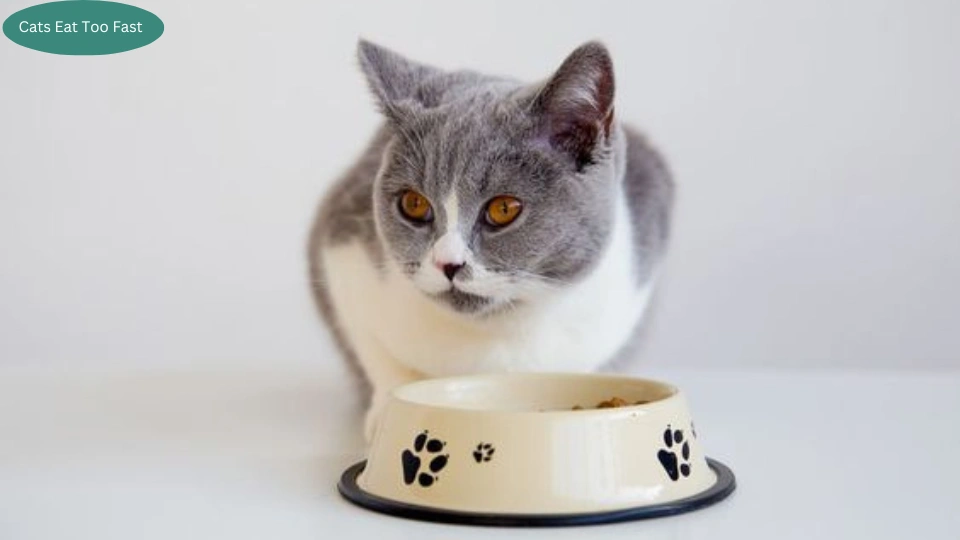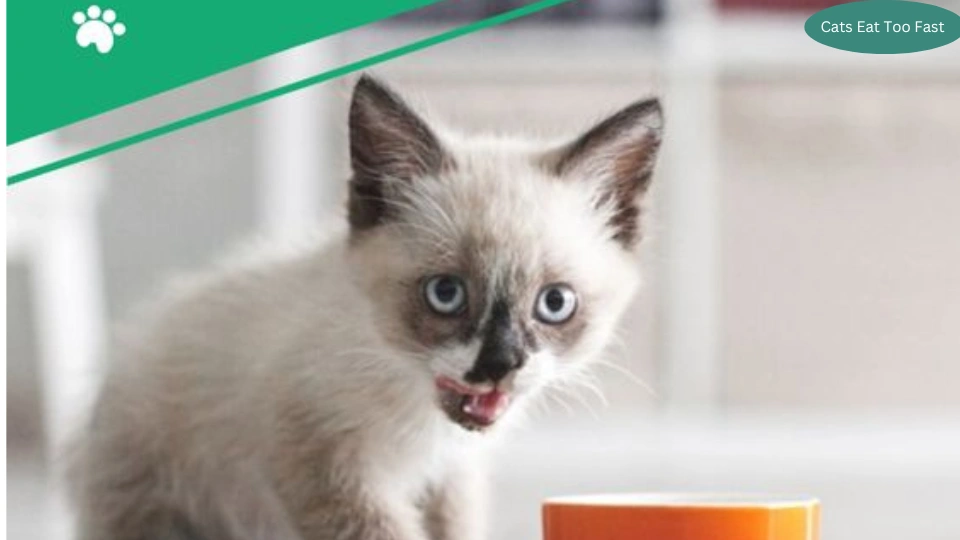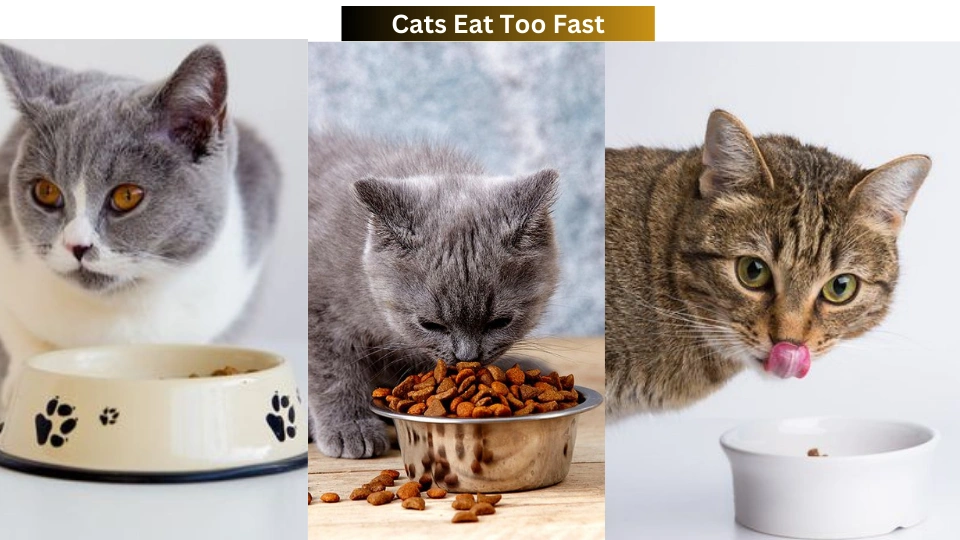Last Updated on February 11, 2024 by Aftab Tariq
Cats eat too fast for various reasons, such as an inadequate diet, boredom, or underlying health issues. Unfortunately, this rapid eating can lead to vomiting because their stomachs struggle to properly digest the food.
The good news is that there are effective ways to address this issue. By attending to any underlying health concerns, preventing boredom, and using a specially designed slow feeder bowl for their food, you can help prevent your cat from eating too quickly.

When cats eat too much and vomit, it’s not traditional vomiting but rather a process called regurgitation. This involves bringing the recently ingested food and fluid back up through their mouths.
As a result, the regurgitated material may be fully formed or appear soggy. This article will delve into the reasons behind cats’ rapid eating habits, the phenomenon of regurgitation, and provide guidance on how to manage and prevent these issues effectively.
So, if you’ve noticed that your cats eat too fast, understanding these aspects can help you create a healthier and more comfortable eating environment for them.
Cat Eating So Fast Why?
cats eat so fast for various reasons, including behavior issues and boredom. As a responsible owner, watch for changes in eating speed. If your cat suddenly eats rapidly, consult a vet for guidance. Here are several potential explanations for why your cat may be engaging in such speedy eating habits.
Why do Cats Eat Too Fast?
Is Your Cat Feeling Bored?
Cats, similar to humans, may engage in quick eating when bored, seeking mental stimulation. If your cat is feeling bored, they might eat too fast due to loneliness, depression, or anxiety. Overeating can result in weight gain and contribute to feline depression. Recognizable signs of cat boredom encompass repetitive behaviors, aggression, lethargy, disinterest, and excessive eating, emphasizing the concern that cats eat too fast.
Is Your Cat Being Territorial?
Territorial cats, like other feline behaviors, might eat too fast to keep other cats away from their food, especially in homes with multiple cats. This behavior, often seen in multi-cat households, involves asserting dominance by eating more or guarding their food. Territorial cats may show aggression towards other pets and engage in destructive behaviors like marking furniture with their scent. It’s important to address these issues promptly, as territorial behavior adds to the concern that cats eat too fast.
Not Enough or Insufficient Diet
Cats that don’t get a balanced diet may eat too fast because they feel hungry, lacking essential nutrients. It’s crucial to feed them specific amounts based on their age, weight, and life stage—kittens, adults, and senior cats have different needs. Kittens, in particular, need more calories for growth.
Avoid low-quality diets with too many carbs, additives, and byproducts, as they may not provide the necessary nutrients. If your cat is thin, consult a vet about adjusting portions for healthy weight gain.
Overweight cats shouldn’t increase calories, as it may signal a health issue. Keep an eye on your cat’s diet for their overall well-being, especially if you notice them eating too fast.
Trauma
Cats from challenging backgrounds might exhibit the behavior of eating too fast due to underlying anxiety. Those uncertain about their next meal, such as cats from neglectful homes or outdoor cats relying on hunting, may develop a habit of fast eating to avoid missing out.
Additionally, trauma can trigger anxiety in cats, leading them to eat faster as food becomes a distraction from fear. Therefore, if your cat is eating too fast, it could be their way of self-soothing anxiety rooted in past experiences, highlighting the concern that cats eat too fast.
Disease Or Ailment
Certain health issues may cause your cat to eat too quickly. For example, hyperthyroidism can lead to weight loss and increased appetite, while diabetes may result in heightened hunger. When their body struggles to use the food properly, cats may crave more nutrients.
Rapid eating can also indicate the presence of gastrointestinal parasites in cats, with rates reaching up to 45% in some populations. Parasites like roundworms and tapeworms might make your cat eat faster as they take away essential nutrients.
Is Your Cat Enjoys Eating?
All animals enjoy eating, and your cat may really love food, especially if they eat too fast ,rub against your leg during meals, and make sounds when you have food out. Cats can become quite attached to food, leading to odd or even aggressive behaviors to get more from their owners.
Cats with a strong attachment to food may meow during meals to ask for more, act impatient, eat quickly, and rub against you to speed up the feeding process. They might even beg for your food when you’re having a meal.
Why My Cat Eats too Fast and then Vomits?
If your cat eats too quickly and vomits, it’s likely regurgitation. This happens when contents from the esophagus are expelled, and unlike regular vomiting, the food doesn’t reach the stomach. So, the vomit consists of undigested food, fluid, or mucus, often in a tubular shape due to esophageal compression.
Cats eat too fast and vomit can also occur if they overeat because their stomachs have a limit on food intake. To prevent this, it’s better to feed them smaller portions throughout the day instead of letting them consume all their daily calories in one meal.
Another common reason for post-meal vomiting in cats is related to their food. They might struggle to digest it or react negatively to certain ingredients, like additives and preservatives, causing gastrointestinal issues. Keep in mind that cat vomiting can have various reasons, so it’s essential to keep an eye on their behavior and overall health.
How Can I Prevent My Cat From Eating too Quickly?
Before you try to slow down your cat’s eating, make sure to have them checked by a vet to rule out any health issues. Some illnesses can make cats eat too fast, so it’s important to address that first. Once the vet gives your cat a clean bill of health, you can follow these simple steps to stop your cat from eating too fast:
Enhance Playtime and Provide Stimulation
Keep your cat from getting bored, anxious, or depressed by giving them mental and physical stimulation. Instead of relying on food, use toys and playtime to keep them active and happy.
Give Your Cat Healthy Food
Not all cat foods are the same. Inexpensive choices, whether wet or dry, might not provide your cat with the nutrients they need, causing them to eat too much or too quickly to compensate. Cats require a diet rich in protein, low in carbs, and with sufficient fat, vitamins, and minerals.
When selecting cat food, look for the Association of American Feed Control Officials (AAFCO) statement to ensure it meets complete and balanced nutrition standards. Your cat’s nutritional needs change with age, so always choose food tailored to their specific life stage.
Provide Meals to Your Cats Individually
Because cats can be territorial, it’s a good idea to feed them separately, even if they play together. This helps avoid conflicts and allows for individual monitoring.
You can use microchip feeders that open and provide food only when a cat’s microchip is scanned, preventing other cats from entering and stealing their food.
Give Cat Treat Toys and Slow Feeders a Try
Choose a Cat Bowl Designed for Slower Eating or Try a Lick Mat
To tackle the issue of Cats Eat Too Fast, consider incorporating a slow-feed cat bowl or lick mat into their mealtime routine. These specially designed items feature grooves that turn eating into a small puzzle, slowing down your cat’s pace.
By addressing the common problems associated with rapid eating, such as vomiting, indigestion, and bloating, these tools provide a practical solution.
Moreover, they offer mental stimulation for your cat, and the act of licking can have a calming effect, making them beneficial for anxious felines. Whether your cat’s speedy eating is due to anxiety or other reasons, slow feeders and lick mats are a valuable option.
Automatic Feeder

Conclusion
Choking, digestive problems, obesity, regurgitation, and behavioral concerns are just some of the issues that can arise from a cat eating too quickly. Feeding a smaller, more frequent meal, switching to a slow-feed bowl or puzzle feeder, and altering the food may help prevent these issues. If the problem persists or if your cat develops any other health problems, it is essential to schedule an appointment with your veterinarian.
Read Also: Rusty Spotted Cat For Sale in Different Countries
Frequently Asked Questions
What Happens if a Cat Eats too Fast?
How Can I Slow Down My Cats Eating?
How Much Should a Cat Eat a Day?
How Do I Stop My Cat From Overeating and Throwing Up?
How Can I Slow Down My Cats Eating?
How to Stop Cat From Eating too Fast?
To slow down a cat’s eating:
- Use a slow feeder bowl.
- Offer smaller, more frequent meals.
- Place obstacles in the dish.
- Spread food out on a plate.
- Use puzzle feeders or food-dispensing toys.
- Consider wet food instead of dry kibble.
Monitor eating habits and consult a vet if issues persist.
What Happens if Cats Eat too Fast?
When cats eat too quickly, it can lead to various health issues such as vomiting, regurgitation, gastrointestinal discomfort, bloating, and potentially choking hazards. Rapid ingestion of food can also contribute to obesity and behavioral problems.
Can Kitten Eat too Fast?
Yes, kittens can eat too fast, which can lead to digestion problems and choking hazards. Monitor their eating habits and consider using specialized bowls to slow them down. Consult a vet if you have concerns.
Can Cats Eat too Fast and Throw up?
Cat eating too fast and vomiting is a common issue. Rapid ingestion can lead to discomfort and vomiting due to swallowing air or overfilling the stomach. Monitoring their eating habits and implementing strategies to slow down their eating pace can help alleviate this problem.
Can Cat Eating too Fast Cause Coughing?
Yes, cat eating too fast and coughing can be related. Rapid ingestion of food might lead to swallowing air, causing discomfort and occasional coughing. Monitoring their eating habits and finding ways to slow down their pace can help prevent this issue.
Why Does My Cat Vomit after Eating Wet Food too Fast?
My cat eats wet food too fast and throws up. Rapid ingestion can lead to vomiting as they swallow air along with the food, causing discomfort. To prevent this, try feeding smaller, more frequent meals and using slow feeder bowls to slow down their eating pace.
References
Cornell University College of Veterinary Medicine
Danbury Animal Welfare Society
I am a dedicated content writer with more than five years of experience, particularly skilled in the art of storytelling. My writing journey commenced during my college years, where I pursued journalism and unearthed my talent for creating captivating narratives.


